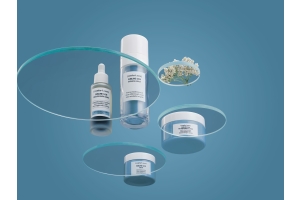Summer has arrived and we’re all excited for longer days, short-sleeved tops and leisurely days in the sun. This also means that we’re likely to shed heavy clothing and show more skin, while invisible UV rays are masked in warmth of the sun. This is why SPF is a crucial step in our daily summer routine.
As important as it is to wear SPF while at the beach, or in the sun for long periods of time, it is just as important to pick a sunscreen for daily use. Day-to-day activities like going to and from our car can damage the skin on our face, neck and arms without protection from the sun. So, what should you be thinking about when choosing a summer SPF? Read on…
What is the difference between Physical and Chemical Sunscreens?
Chemical sun protection is popular and can be easily purchased at most stores. Grocery store and drug store shelves are full of chemical SPF products which would lead one to believe that they are the best option - don’t be fooled. Physical SPF skincare products are the better choice for your skin, your body and the environment. Why?
- Chemical SPF absorbs UV rays into your skin and then, through a chemical reaction, turns them into heat to disperse them. This mechanism heats up the dermis layer of the skin which can cause irritation, redness and discomfort. Physical SPF instead, bounces UV rays off your skin like a mirror, offering more effective protection. Plus, UV rays are never absorbed into the skin.
- Some ingredients found in Chemical SPF can cause skin irritation, compared to ingredients found in Physical SPF that typically soothe and calm the skin.
- In order to get effective protection from Chemical SPF after the first application, it must be washed off before reapplying. This is because the chemical compound in the SPF must be absorbed by the skin to work properly. If residue of expired SPF gets in the way of new SPF absorbing into the skin, it is prevented from working as effectively. Physical SPF can be layered without washing it off.
Do I need UVA and UVB Protection?
Always choose broad spectrum SPF because not all UV rays are the same - both UVA and UVB rays are harmful to the skin. UVB rays are the most common rays from the sun that SPF products are created to protect the skin from. UVB rays are most harmful in summer months of the northern hemisphere and during the brightest hours of the day. These are the rays that cause the skin to burn. UVA rays, on the other hand, are much more deceptive. UVA rays are relevant during all times of the year during daylight hours. They have the ability to penetrate glass and clouds and are known to degrade the skin’s youthfulness. Several kinds of skin cancer are the result of damage from UVA rays. We To effectively protect against both UVA and UVB rays (which we recommend), always choose a broad-spectrum sunscreen.
jane iredale The Skincare Makeup, offers a great assortment of makeup and skincare SPF products that are recommended by the Skin Cancer Foundation. Here are some of our favourites:
- Powder Me SPF 30 Dry Sunscreen– sheer coverage with SPF 30
- PurePressed Base Mineral Foundation– semi-matte finish and sheer-to-full coverage with SPF 20/15
- Amazing Base Loose Mineral Powder – luminous finish and sheer-to-full coverage with SPF 20/15
- Glow Time Pro BB Cream– radiant-satin finish and medium coverage with SPF 25
- Enlighten Plus Under-Eye Concealer – semi-matte finish and full coverage with an SPF of 30/20
- LipDrink Lip Balm –hydrating lip balm with SPF 15







Enter the email associated to your BeautySense account and we'll send you a link to reset your password.